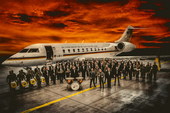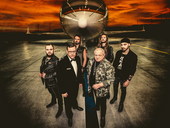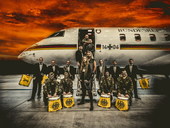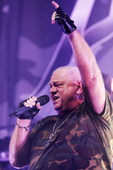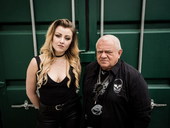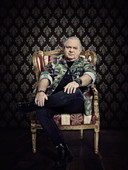U.D.O.
No Limits Revisited
12.07.2020
Архив интервью | Русская версияLess than two years ago we published a big feature on Udo Dirkschneider, based on his news conference and a lengthy meeting with fans in Moscow. It seemed back then that everybody got answers to all of their questions. However, Udo is not a musician who likes to sit still, and even though the music world is going through tremendous difficulties due to the corona crisis, he is back with a new album called “We Are One”, and it’s much more than a regular U.D.O. album. The whole affair was recorded with a brass orchestra of the German Bundeswehr, and these are not remakes of some well-known classics, but totally new songs written specifically to be performed with an orchestra. That seemed like a very good reason to talk to Udo again, and as an added bonus, he also had his son Sven (drums) on the line, who contributed a lot of interesting thoughts and stories.
It’s not the first time you are working with an orchestra, but previously you cooperated on old U.D.O. songs, and this time you’re coming out with 15 absolutely new compositions. What was the starting point of this new cooperation – did you first decide to work with Bundeswehr Musikkorps and then started writing songs, or did you first have some songs and then decide to record them with an orchestra?
Udo: The idea was coming up when we did a show together with them at Wacken, but it was a short concert, we just did some U.D.O. songs and Accept songs, and they were putting their arrangements on top of them. Then we did a long show with the orchestra, it was over two hours, and after this we said, “OK, why are we not doing something creative together?” That means not putting something on top, but also composing together with the orchestra and for the orchestra. We started working on songs, composing songs for the orchestra, and the whole thing took one year – songwriting, arranging, going back and forth with all that stuff. And here we go – this is an album about which you can say that we worked together with the orchestra, and the songs were ready-made for the whole thing.
What’s the most difficult part in cooperating with an orchestra? How difficult or easy it is to bring your musical ideas across to the orchestra guys?
Udo: First you need to write songs for this, that’s the first step that we did, and then we had to choose which ones were working together with the orchestra. When we had all the songs, we were sitting together with the guys from the orchestra, and they would say, “OK, this one can fit, this one can fit, and this one can fit”. Only after that we started working on everything.
Now a question to Sven. How do you like playing with an orchestra? How much is it different for a drummer from playing with a regular metal band?
Sven: I enjoyed it a lot, I have to say. Of course, it’s something completely different, because we also work with the orchestra conductor, and I have to work very closely with him in order to keep timing and all that stuff. Yeah, it’s different compared to when you just play in a heavy metal band, and you pretty much are the timing as a drummer. The conductor, of course, is conducting his orchestra, and I have to follow him as well. But on the other hand, when there are intros of songs and whatever, I might be the guy who starts the song with the timing – this has to be right, and we have to communicate a lot. Yeah, it’s a big difference, because you have so many components coming together on stage, so many different instruments. The orchestra has a percussion section, which is, I think, 10 or 12 people in total, and there’s 65 people in total in this orchestra, so it makes a big difference as the songs are completely different. It’s not following a strict structure or a heavy metal structure, there’s a lot of C-parts going on, which extend, and there are saxophone solos and trombone solos and whatever in these songs. It’s a lot of fun and it’s a big challenge for myself and, I think, also for all the other guys in the band. It’s a good challenge.
Udo, it was a big surprise for many fans to know that your former Accept colleague Peter Baltes was also part of the songwriting for this album. You previously said that you had no contact with anybody from the recent Accept line-ups except Herman Frank. How did it happen that you and Peter are again on the same boat?
Udo: Yeah, the last time I was talking to Peter was in 2005, when we did this festival reunion stuff with Accept. From the beginning on, Stefan Kaufmann was involved in the orchestra stuff, and he was working with Peter on some songs – I don’t know, maybe for Peter’s solo album or whatever. I met him in Stefan Kaufmann’s studio, and… let’s say it this way, I don’t wanna go too deep, but I never really had problems with Peter Baltes. When I met him again, it was like, “Hello”, and we started talking about a lot of things. Then he said, “I heard you’re doing an interesting thing with an orchestra…” I said, “Yes”, and he said, “Maybe I can also so some stuff? I also have some ideas.” I said, “Yes, why not? Go ahead. We are open-minded.” That was the point when we started working together with Peter, and I think he came up with really good ideas together with Stefan, and everybody is happy. It’s not a typical U.D.O. album that we did, this is more of a project for me. Of course, there is still heavy metal stuff, but for me it’s a little bit more than heavy metal – we have a symphony brass orchestra, and it’s sometimes harder than if we just do normal two-guitar stuff with a heavy metal band. In the end, that’s the story why he was involved in the whole thing.
There was a rumor that Peter quit Accept because he didn’t like touring with an orchestra, and now he gets involved into a project where he does exactly that – working with an orchestra. So it was a big surprise for everybody.
Udo: Yeah, a lot of touring was planned for this year, but nothing has happened, and nothing will happen this year. We are very sad that we cannot do the show at Wacken together with the orchestra, and there were other tours - it was planned to come to Russia again, to South America, which has not happened. Then it was planned to do a tour with Helloween as Dirkschneider, and it looks like it will not happen. Our American tour at the end of the year is not happening either. The only thing that is happening is that we’re working on a new U.D.O. album, we have time enough to do this. That’s what we’re working on at the moment.
When working with an orchestra, did you take into account what other metal bands have been doing with orchestras? For instance, “let’s look at what Metallica did and do not repeat their mistakes”.
Udo: You know, already back in the days when I was working with Stefan Kaufmann in U.D.O., we were always thinking, “We wanna work together with an orchestra.” We tried many things, but with symphony orchestras where you have violins and all this stuff, it was always like, “No, this is not the real thing, it is too soft…” Eventually we said, “No, we don’t wanna do it”. And then for a long long time I wasn’t thinking about doing something together with an orchestra, and the reason why I started thinking about it again is that when we were mixing the “Steelhammer” album (2013), the guy who was doing this album as a producer and a sound engineer, was working professionally with the Navy symphonic brass orchestra from the north of Germany. It was nearly Christmas, and they had a concert at a church. I went there with my old bass player Fitty (Wienhold), we didn’t expect anything special, maybe some Christmas songs or whatever (laughs), and then they started playing stuff like ABBA or Michael Jackson, and I was sitting there thinking, “That’s the sound that I was looking for”. The sound was really metal, not like what a lot of bands already did with violin-based orchestras, like Metallica or Scorpions. They were just putting something on top of the songs, like we also did two times with Accept songs and U.D.O. songs, but this one is something special, this is really composed for the whole thing.
A question to both of you. We have heard quite frequently from fans that U.D.O. records are great but a bit too consistent style-wise. Was this new record in any sense a response to these comments, like a proof that U.D.O. can do something maybe not completely different, but much different?
Sven: I don’t think we really thought about this. (laughs) It was just a great plan that we had with this orchestral album. To adapt this to the question you asked before – we didn’t think, “OK, we need to do an album now like Nightwish or Metallica”, or “We can’t do this and this because Metallica did it and it was wrong or whatever”. I think the album we have right now is the result of many people working together on music, and these people were coming from different music genres. It’s not a response to the fans, definitely not, but it shows a lot of different aspects of music that we can do, which is also new for us. Yeah, it feels great!
Udo: If you do a normal U.D.O. album, the fans are expecting a U.D.O. album, the normal stuff, maybe with some surprises here and there. But on this album we were completely free, we could do anything and everything, it doesn’t matter if a you’re using a trumpet, a saxophone…
Sven: …a flute, or a bagpipe, whatever. We were completely open-minded, and there were never things like, “No, we can’t do this, because it needs to be still heavy metal”. It wasn’t the approach – we wanted to be as free as possible and show so much versatile stuff on this album by getting the orchestra and heavy metal music together.
U.D.O. welcomed two new musicians in the band two years ago. Why did you choose these particular guys – Fabian “Dee” Dahmers (guitar) and Tilen Hudrap (bass)? Did you specifically look for someone quite young and not so famous?
Udo: Yeah! When Fitty said he doesn’t wanna do this anymore, I think he was tired of touring and not really into that anymore, of course, we had a chance to get more famous guys, and for the position of guitar player we also had offers from quite famous musicians. But for me it was like – no, I wanna have really fresh blood in the band. With Tilen it was perfect, he fits perfectly in the band, and Fabian…
Sven: He was coming to the rehearsal studio where we rehearsed for the summer festivals. He showed up, and he was well prepared, and we started playing with him, and it just felt good. We said, “That’s it, that’s the guy we wanna have”.
Udo: Now after touring with these two guys and also working on the U.D.O. album, I think that was the right thing to do.
Sven: I think the vibe is very good on tour, we get along very well, everybody. There’s a lot of stuff we talk about, and everybody is very enthusiastic on tour, and everybody is having a lot of fun, and that’s maybe the most important thing. Even more important than fitting 100 percent musically-wise is to get along with each other and have fun on tour.
Sven, growing up in a musical family it’s very logical that you have some musical aspirations. But why did you choose drums, not any other instrument?
Sven: That’s a funny question! I think it was Christmas 1994 or 1995, something like that. I was three years old or something like that. I got a guitar and bongos, and Fitty was there, right? So Fitty grabbed the guitar and started playing some funny stuff, and I just naturally took the bongos and counted “Eins, zwei, drei, vier!” in German and started hitting them. It was sort of in time, and I think it was the point when it was clear that I should play drums. I started taking lessons when I was five, and ever since I’ve never stopped. That’s the story behind that.
Sven, you have quite a few powerful drummers in U.D.O. to look up to – Stefan Schwarzmann, Lorenzo Milani, Francesco Jovino, and also Stefan Kaufmann in Accept. Who of them made the biggest impact on you?
Sven: The biggest impact, of course, was Francesco, because I used to work for him as a drum tech. I was sitting behind his kit for a couple of years watching him play every night. And of course, Stefan Kaufmann taught me a lot in the studio, when I was recording my own band with him. Back when I was 12 or 13, we recorded an EP in his studio, and he showed me a lot. I would say these two are definitely the biggest influences from this kind of music.
The song “Rebel Town” is said to be “a hymn to the 30-year-reunited Germany”. Udo, do you remember your thoughts and feelings about the unification of Germany when it first happened 30 years ago? How did you see the future of Germany back then? To what extent have your hopes and visions come true?
Udo: I think I was in the studio working on “Mean Machine” (1989). I was watching the TV and was like, “What is going on there?” I mean, we had seen already a lot of stuff going on, demonstrations, people had been saying that they wanna open up the wall, have more freedom and stuff, but still when I saw on TV that the wall was opening up, I was like, “What?” I think it took a while for the people, both the East and the West, to realize what’s going on. For younger people from Eastern Germany it was a completely different world to come to Western Germany and see what’s going on. For me, to be honest, I was never thinking that it has to come back, I was growing up in Western Germany, I saw the wall coming, and I saw the wall going down. Sometimes it was a little bit strange to see how long it took to get the country together. But on the other hand, it shows me that there can be a revolution without war, people wanted to be free – and it was working.
U.D.O. have had the theme of humanism, of bringing out the best in humans, since the very beginning, since “Animal House” (1987), where you had songs like “Warrior”, which can be consistent humanistic. Do you believe your music, or music in general, helps change something in humans?
Udo: I always try to write some stuff against war. If you take the song “They Want War”, it was written at the time when there was a war between Iraq and Iran, and there were children at war, and also in Africa still young kids have guns and try to be soldiers. This is the stuff I’m really against. I’m anyway against war, and if something has happened, I always try to write something about it.
Sven: I think that music is very important for people anyway. Every person can tell stories of him or her having bad times or good times, and listening to music, and the music empowers the mood you have at the moment. You can listen to very sad songs when you’re in a very shitty mood, and it brings you up to a better feeling, or even worse, so music is very important for people. I also believe that people change while listening to music because they re-think their opinions or ideas.
Do you think the world has changed for the better in terms of humanism for the past 30 years? After all, wars continue and the hunger continues in so many areas on the world…
Udo: (makes a heavy sigh)
Sven: We still have a lot of trouble going on worldwide. For example, in Germany we don’t have a war, but many people don’t even know there is still a war out there in many places. I think that’s the part of the media, because it won’t get shown. You won’t see a lot of news about a war that is going on somewhere in the world. It’s very regional what they show. There’s still a lot of stuff going on, and we need to change that.
In continuation of the Accept theme – Udo, in Moscow at the press conference two years ago you said that the Dirkschneider project will stop in autumn that year. But Dirkschneider will hopefully be back in Russia again in October opening for Helloween. What made you change your mind?
Udo: I mean, that was two years ago, and in a way everybody was happy that we were now going back to U.D.O. But then we got this offer from Helloween to do the tour together, and they asked us, “Maybe you could do this as Dirkschneider with only Accept songs?” In the beginning we were reluctant, but in the end we said, “OK, why not?” Another European tour with U.D.O. was not really planned, it was only planned to do South America and then come back to Russia with a different setlist. So we said, “OK, why sit at home when we can take the chance to go together with Helloween?” They are very good friends, and Weiki (Michael Weikath, guitar) was saying, “Oh, I’m really looking forward to this, so that I will be able to hear my favorite Accept songs that I was listening to when I was younger”. (laughs) He’s very funny. Also it was a chance for us to go to really big arenas, so why not?
Sven: And it’s just fun to play the songs, to be honest. (laughs) It’s a lot of fun to play these songs, and it’s a good package for the people as well.
Udo: Maybe some people didn’t really get it. I always said, “OK, I don’t play any Accept songs anymore – with U.D.O.” That’s why we did this Dirkschneider thing and did not call it “U.D.O. playing Accept songs” – we wanted to split it up. We gave it a different name so that nobody would think it’s U.D.O. playing a couple of Accept songs. With Helloween, we’re going out as Dirkschneider, and everybody knows that if we do it as Dirkschneider, that we play Accept songs.
We’ve noticed that in U.D.O. both guitarists are doing solos (not sure if there’s a 50/50 percent split, but both guitarists are soloing a lot), while in Dirkschneder Andrey Smirnov is basically playing what Wolf Hoffmann played originally, and the second guitarist, no matter who he is, is mostly focusing on the rhythm parts. Why is that?
Udo: In Dirkschneider Kasperi (Heikkinen) was definitely playing a lot of stuff, also solo-wise. The main songs, such as “Princess Of The Dawn”, “Metal Heart” – that’s Andrey, but it’s not that Andrey is playing all the solo stuff. On “Steelfactory” (2018) he was alone, also composing-wise – we had a second guitarist, Bill Hudson, but he wasn’t involved in songwriting or recording, so Andrey was doing everything on his own, he did a really good job on “Steelfactory”. At the moment we are working on a new U.D.O. album with the new guitar player, Fabian Dahmers, and they are working really together as two guitarists. They say, “Oh, you can play it better than me, you can play in this song, this song and this song”. There’s a really equal thing going on, they’re working together perfectly.
Sven: And it was the same in Dirkschneider ever since.... The only exception was when Stefan played, because he said, “Hey Andrey, you can play it a million times better than me, just go for it, that’s cool”. But Bill and Kasperi, both of them, they also played a lot of solos in the Dirkschneider setlist.
Udo: Definitely Stefan Kaufmann is not a guitar player for solo stuff. (laughs)
Udo, you have been pretty much on the road all your life. What do you do when you are tired or sick on your, but you still have a gig to play on that day? Do you have any secrets of how to get yourself in a good shape quickly?
Udo: Me? I’m always in a good shape! (everybody laughs)
So you’re never tired, you’re never in a bad mood or anything like that?
Udo: Of course there are some days when you think, “Wah…” or the can be something around you, but most of the time… What can I say? I think in my life I have been really lucky to do what I really like to do. I’ve been doing it for more than 40 years, and not many musicians can do it for that long. And we always try to keep it interesting, for example, now we’ve done that orchestral album. We are not a band that sits down and says, “Oh, now we have to make an album like this or this, maybe we can do an album again like ‘Animal House’…” No! It’s always something new, a new challenge - and here we go! It keeps you fresh. And I still like to be on tour. I always say that as long as I have fun doing this, I will do this. If I get a feeling like, “Ohh, another tour? No…”, then definitely I will stop. But this is definitely not happening at the moment. (laughs)
The most logical way to finish this interview is to ask you when we will be able to see you in Russia again, but that’s difficult to discuss now because of the corona situation…
Udo: Everything is on hold. The Russian tour was normally planned for the end of March and April, then they postponed it to May…
Sven: …then they postponed it to September, but it is already clear that this won’t happen. Unfortunately we just can’t. We would love to, but…
Udo: Maybe next year will be the year of the most touring with U.D.O. ever. (laughs) Everybody says, “Oh, we wanna do it”, but we have to wait until everything is open, and we can fly again. I hope it will be over soon, but this year is just… We are working on our U.D.O. album, and then for the rest of the year we will have – maybe a wrong word – holidays, doing nothing. Let’s wait and see what’s going on.
Now let’s come back to the press release for “We Are One” for one last question. It says that this album was your musical dream for a few years. Do you still have other musical dreams, something that you haven’t done in your career, but would still want to do?
Udo: Yeah, I’ve always been thinking about a rock opera or a musical. Now with this orchestra thing that showed already that you can do a lot of things, if I have time… I mean, this orchestral album took us one year of work: composing, arranging, recording and all that stuff. If I start doing a musical or something like that, it will also be a long-time project. But we will see. This is definitely what I can imagine doing.
U.D.O. on the Internet: https://www.udo-online.com
Special thanks to Irina Ivanova (AFM Records) for arranging this interview
Interview by Roman Patrashov, Natalia “Snakeheart” Patrashova
Photos courtesy of AFM Records
May 11, 2020
© HeadBanger.ru
